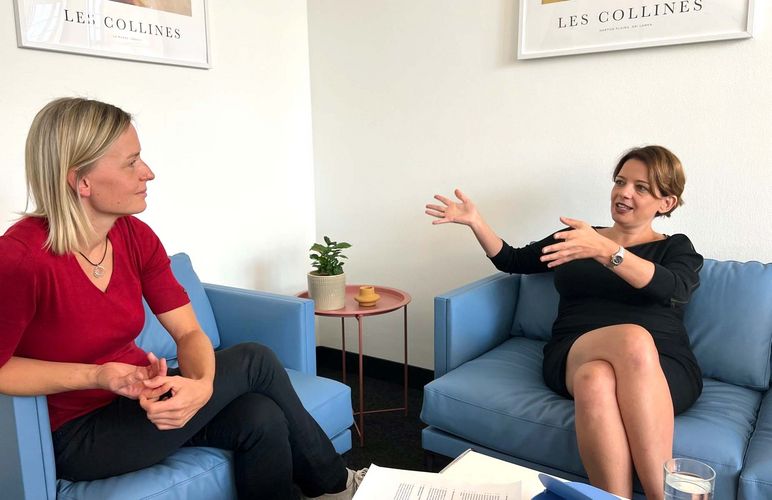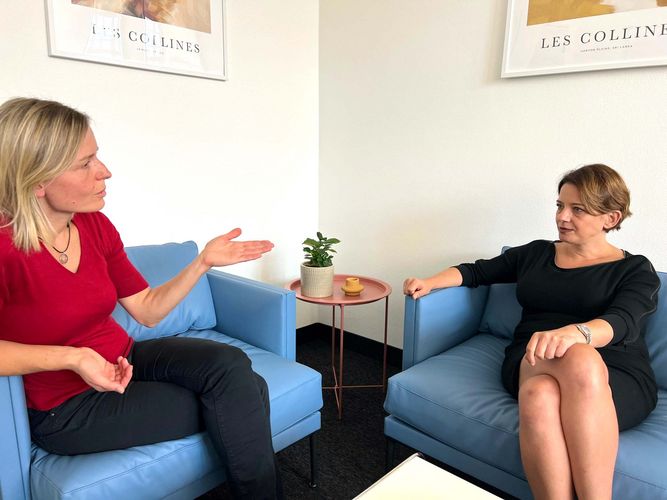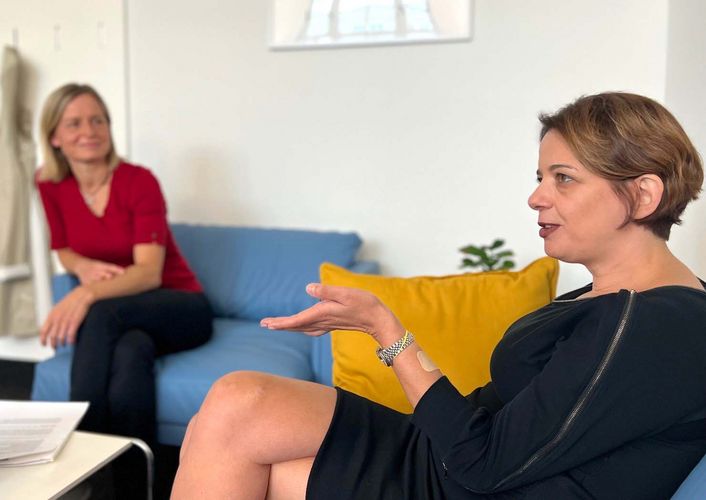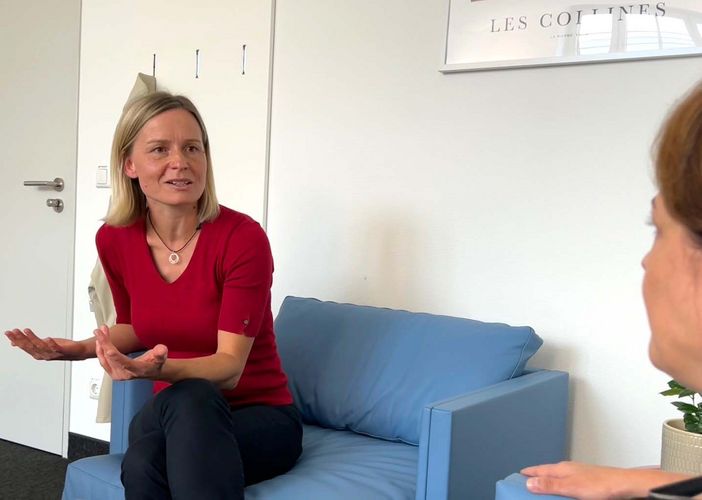How have your tasks changed since 24 February?
Carmen Bachmann: My work tasks themselves haven’t changed at all, because I’m actually a professor of taxation. On the side, however, I volunteer on the Chance for Science project, a social network that aims to connect refugee scientists, academics, and students with German research institutions. Since the beginning of the war in Ukraine, I have been contacted by many Ukrainian scientists. Compared to the Syrian and Turkish refugee academics back then, there are now many more, and they are not here in Germany, but for the most part still in Ukraine. I deal with people who are in a war zone, whose colleagues have fled, are currently fighting on the front lines, or have died in the war. As a result, these Ukrainians have a very strong need to network, because they want to continue in their field and are looking for new partners to collaborate with “remotely”. I have noticed that they have a great fear that their science will be atomised. They worry that Ukrainian science will eventually be scattered all over the place, and that their country’s research landscape, which is actually very strong, will slowly break up. Overall, this target group has brought a new quality to my dealings with the Chance for Science project, because before I was assisting people in Germany who were safe here after fleeing, whereas now I worry when I don’t get a reply to an email and wonder whether everything is okay.
Antje Schöne: At the International Centre, I have been dealing with students coming to us from abroad for ten years now. Since February, we have received an increasing number of inquiries from refugee Ukrainian academics wanting to know what opportunities they have to continue their studies here at Leipzig after fleeing. This has led to an increased need for guidance services, which is why I too now also deal with this target group. The Ukrainian academics want to know from me, for example, how they can manage to gain a foothold in academia here, where they can get suitable funding for this, whether it is possible for the University to create positions for them, which residence permit they need, or also the best way to bring their family with them to Germany. These are all areas with which I have had to familiarise myself, in part for the first time, and in which I naturally have to keep up to date so that I can advise people professionally. Compared to the needs of international students, who know exactly that they want to study here, this area of international academics is much more granular and very individual.
- “The majority of Ukrainians who are already here with us are at the individual institutes, so sometimes we don’t even know exactly who is where and under what agreement, what they need, what their residence status is, and so on. Keeping track of this and trying to keep an eye on everyone is quite challenging for me at the moment.”
Antje Schöne
What do you see as the biggest challenges here?
Carmen Bachmann: The fact that the people I communicate with are in a war zone is probably the biggest challenge for me. For example, if I read in the news that a particular Ukrainian town is currently under rocket attack and I know that someone is there with whom I recently had email contact, then of course I worry, because through communication you also develop a relationship with the people. Another challenge, of course, is the sheer number of inquiries we receive. A week ago, the digital Chance for Science conference took place, where Ukrainian scientists were able to present their research topics in numerous fields online. More than 400 people signed up for the conference and we had in excess of 165 presentations from all sorts of academic disciplines. From agricultural sciences to computer science, to medicine and cancer research. It was really challenging for me to structure this large number of presentations in such a way that I could find suitable German research partners. For example, when a Ukrainian agronomist sends me an abstract about genetic changes in the emigration of pigs from Ukraine to Germany, it takes me half a day to even understand what the research is about. Only then, of course, can I find a suitable German research partner. And I was struck by how strong the need and the urge of the researchers is, despite the adverse circumstances, to exchange ideas with colleagues and to share their knowledge. From this I conclude that a scientist will always remain a scientist, no matter what the circumstances.
Antje Schöne: I feel the same way with regard to the many different needs of Ukrainian researchers. The majority of Ukrainians who are already here with us are at the individual institutes, so sometimes we don’t even know exactly who is where and under what agreement, what they need, what their residence status is, and so on. Keeping track of this and trying to keep an eye on everyone is quite challenging for me at the moment. On top of that, of course, the issue of prospects for the future is also a major challenge. At the Faculty of Philology, for example, many Ukrainian academics were already involved in the summer semester by way of three-month visiting scholar agreements, which was also a means of paying them. But these agreements have now expired, which raises the question of what comes next. It’s not that the University simply has the money to spend, rather it’s a question of perhaps applying for individual scholarships. Now we have to try to keep track of the individual cases and see where these Ukrainian academics currently stand, what they are doing now, how secure they are financially, or whether they have perhaps already returned. This is a rather difficult matter.
- “[A] Ukrainian scientist wrote to me early in the morning of the conference day saying that relief supplies had now arrived in Kharkiv, and that he was unfortunately unable to give his lecture because he was helping to distribute the supplies. We already had his slides, so we held his presentation for him. All these moments do give you goose bumps [...]”
Professor Carmen Bachmann
What moment in your work with Ukrainians has touched you the most and why?
Carmen Bachmann: There have been so many of these moments. I remember, for example, a Ukrainian historian who gave a talk at the first Chance for Science conference on 22 April and apologised at the beginning for having such a long beard. He explained that he had not shaved his beard since Russia’s invasion, but only ever trimmed it slightly to mark minor military successes. Another Ukrainian scientist wrote to me early in the morning of the conference day saying that relief supplies had now arrived in Kharkiv, and that he was unfortunately unable to give his lecture because he was helping to distribute the supplies. We already had his slides, so we held his presentation for him. All these moments do give you goose bumps, because you really can relate to the individual fates of the people in Ukraine.
Antje Schöne: My consultations with the Ukrainian researchers who have made it this far are now increasingly taking place in person. I had a lot of contact with one Ukrainian woman in writing prior to our in-person consultation, and then she asked me if she could bring her five-year-old son to the appointment because she had no one else to look after him at the time. Of course, that wasn’t a problem and when I was at home the evening before the meeting, I thought to myself that it must be rather boring for a little boy to have to sit through a consultation about residence law. So I fished out a jigsaw puzzle from the cupboard, because my young son is also five and loves doing puzzles. The next day, as the little Ukrainian played with the puzzle during the consultation, I thought to myself that this child, the same age as my own son, is now in a foreign country, in a completely new environment, and also without his father – who was drafted by the military in Ukraine. To have this fate so personally in front of my eyes, that was a moment that touched me incredibly.
On the other hand, though, I’ve also been touched by the stronger sense of togetherness within the University since 24 February. Whether in administration, on the part of funding bodies, in the individual institutes or the vice-rectorates – everyone is working closely together to help this target group in the best possible way and to establish processes that make it easier for them to find their feet and continue living here in Leipzig and at the University.




Comments
No comments found!